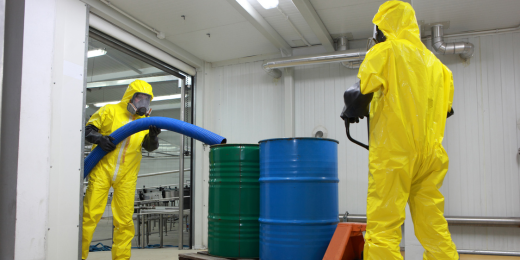Not known Incorrect Statements About Reclaim Waste
Table of ContentsFacts About Reclaim Waste UncoveredWhat Does Reclaim Waste Mean?Little Known Facts About Reclaim Waste.Not known Facts About Reclaim WasteRumored Buzz on Reclaim Waste
Explore the types, events, and types of liquid waste. Domestic sewer waste describes the waste and products from a residential sewage-disposal tank. This kind of waste is developed by humans in homes, institutions, and other buildings. This only includes septic systems that have a drain field. The appropriate administration and disposal of domestic sewage waste call for liquid waste to be transferred to a sewage therapy plant where the appropriate techniques and devices are put on detoxify and take care of waste.
Industrial waste usually includes potential hazards, such as combustible materials or a mixture of liquid and strong waste products, and needs an advanced and in-depth disposal procedure. The disposal of industrial waste normally involves the filtering of waste before transport to ensure safe and correct disposal. Industrial waste is produced from byproducts and overflow of commercial processes and manufacturing.
This kind of waste can not use the exact same sewer administration transport or procedures as septic or industrial liquids. The hazardous waste administration process calls for the inspection and testing of fluid waste prior to it undertakes the disposal process (industrial wastewater treatment). Overflow waste is the liquid waste that originates from drainage and excess stormwater in very booming areas or cities
Drainage waste can cause contamination and flooding otherwise taken care of correctly. Learn a lot more about drain cleansing and waste management. Making sure proper waste monitoring can protect against disasters and decrease ecological injury. Both people in residential setups and specialists in business or production industries can profit from recognizing the processes and policies of fluid waste management.
The Ultimate Guide To Reclaim Waste
Get in touch with PROS Providers today to find out about our waste management and disposal services and the correct methods to look after the fluid waste you produce.
(https://reclaimwaste1.blog.ss-blog.jp/2024-11-12?1731425991)Do you understand what occurs to your water when you disengage, purge the bathroom or drain pipes the washing equipment? No? Well, it's worth recognizing. This supposed 'wastewater' is not only a vital resource but, after therapy, will certainly be launched to our land, waterways or the ocean. Used water from bathrooms, showers, bathrooms, cooking area sinks, washings and commercial processes is called wastewater.

water used to cool down equipment or tidy plant and equipment). Stormwater, a kind of wastewater, is runoff that moves from agricultural and metropolitan areas such as roofing systems, parks, yards, roads, paths and rain gutters right into stormwater drains, after rainfall. Stormwater moves without treatment straight to regional creeks or rivers, ultimately reaching the ocean.
Reclaim Waste Things To Know Before You Buy
In Queensland, a lot of wastewater is dealt with at sewer therapy plants. Wastewater is transported from domestic or industrial websites via a system of drains and pump terminals, understood as sewerage reticulation, to a sewer therapy plant.
The Department of Natural Resources recommends regional governments regarding managing, operating and preserving sewage systems and treatment plants. In unsewered locations, regional governments may require owners to install private or home sewage treatment systems to treat domestic wastewater from commodes, cooking areas, restrooms and laundries. The Department of Natural Resources authorises using household systems when they are shown to be efficient.
In some new neighborhoods, treatment of some stormwater to remove litter, sand and crushed rock has actually started utilizing gross pollutant traps. Wastewater therapy happens in 4 phases: Eliminates strong issue.
Wastewater then moves into big storage tanks where solids resolve and are removed as sludge. Oil and residue are skimmed from the surface area. Utilizes small living organisms referred to as micro-organisms to break down and eliminate remaining liquified wastes and great particles. Micro-organisms and wastes are included in the sludge. Removes nitrogen and phosphorus nutrients that might create algal blooms in our waterways and endanger aquatic life.
The 15-Second Trick For Reclaim Waste
Nutrient elimination is not offered at all sewer therapy plants because it calls for expensive specialised equipment. Clear fluid effluent generated after treatment might still include disease-causing micro-organisms - liquid waste removal melbourne.

This generally means wastewater has to be dealt with or impurities gotten rid of before it can be discharged to waterways. Most wastewater streams right into the sewerage system. Under the Act, city governments provide approvals and permits for environmentally appropriate activities (Ages) including wastewater launches that might have a local impact. The department provides approvals and permits to Ages entailing wastewater launches that could have a regional or statewide influence.
Reclaim Waste - The Facts
Or else, examples are taken for research laboratory evaluation. Frequently several examinations are required to develop the levels of each of the various toxins such as navigate to this website oils, hefty steels and pesticides in water. Monitoring gives factual details regarding water quality and can validate that permit conditions are being fulfilled. The information acquired via monitoring gives the basis for making water high quality choices.